Medical Works of Antiquity (16 vols.)
Digital Logos Edition
Overview
Medical Works of Antiquity assembles the writings of Hippocrates, Galen, and Celsus to bring you a comprehensive study of ancient medical practices, theories, and experiences. These texts remained valuable resources for hundreds of years, representing the best medical insight available at the time.
Known as the father of Western medicine, Hippocrates made extraordinary contributions to medical practices and vocabulary, including key terminology still in use today. Categorical terms such as “acute,” “chronic,” “endemic,” and “epidemic,” as well as “exacerbation,” “relapse,” “resolution,” “crisis,” “paroxysm,” “peak,” and “convalescence” were all coined by Hippocrates. While the specific techniques Hippocrates used in fourth and fifth century BC are outdated, Hippocrates introduced a number of medical approaches and the philosophy behind them that medical practitioners still use today, such as the modern adaptation of the famous Hippocratic Oath—included in the Medical Works of Antiquity collection with Hippocrates’ other medical writings.
Six hundred years after Hippocrates, Galen entered the medical field. With the best education available and a wealth of experience, Galen made contributions to medicine that lasted over 1,000 years, and his works were studied by medical practitioners as late as the nineteenth century. Galen knew that understanding the human body’s mysteries was key to medical science, but since dissecting the deceased was illegal under Roman law, he studied anatomy by dissecting pigs and monkeys instead. Through this, he established a greater understanding of the human body than any physician before his time, as well as countless physicians after. Works like On the Natural Faculties survive today as fascinating explorations of ancient medical practices and the logic behind them.
Building from the writings of prominent physicians, Aulus Cornelius Celsus wrote On Medicine as a part of an encyclopedia on agriculture, medicine, military arts, rhetoric, philosophy, and jurisprudence. On Medicine is the only surviving text from the encyclopedia. It offers an accessible and comprehensive explanation of medical science leading up to the first century. All three volumes of On Medicine are contained in the Medical Works of Antiquity, covering subjects including the Greek schools of medicine, prognosis, diagnosis, ailments, treatment, surgeries, and more.
This collection contains the complete texts in their Loeb Classical Library editions. Each volume is included in its original language with an English translation for easy side-by-side comparison. Logos’ language tools help you to go deeper into the Greek and Latin texts and explore each writer’s elegant language. Use the dictionary lookup tool to examine difficult Greek or Latin words and find every occurrence in your library. There’s never been a better way for students of history, medicine, culture, and Greek and Latin literature to absorb these intriguing works.

- A comprehensive study of Roman medical practices, theories, and experiences
- The complete works of the father of Western medicine
- Wisdom that was used for over 1,000 years
- Loeb Classical Library editions
- Title: Medical Works of Antiquity
- Series: Loeb Classical Library
- Publisher: Harvard University Press
- Volumes: 16
- Pages: 3,479

This volume contains W. H. S. Jones’ English translation of Hippocrates’ writings.
Contents
- Preface
- General Introduction
- Ancient Medicine
- Airs Waters Places
- Epidemics I and III
- The Oath
- Precepts
- Nutriment

This volume contains the Greek text of Hippocrates’ writings.
Contents
- Preface
- General Introduction
- Ancient Medicine
- Airs Waters Places
- Epidemics I and III
- The Oath
- Precepts
- Nutriment

Hippocrates, vol. 2
- Author: Hippocrates
- Editors: T. E. Page, E. Capps, W. H. D. Rouse, L. A. Post, and E. H. Warmington
- Translator: W. H. S. Jones
- Series: Loeb Classical Library
- Publisher: Harvard University Press
- Publication Date: 1923
- Pages: 181
This volume contains W. H. S. Jones’ English translation of Hippocrates’ writings.
Contents
- Beginning of Law in Marcianus Venetus
- Preface
- Introductory Essays
- Prognostic
- Regimen in Acute Diseases
- The Sacred Disease
- The Art
- Breaths
- Law
- Decorum
- Physician (Chapter 1
- Dentition
- Postscript

Hippocrates, vol. 2: Greek Text
- Author: Hippocrates
- Editors: T. E. Page, E. Capps, W. H. D. Rouse, L. A. Post, and E. H. Warmington
- Series: Loeb Classical Library
- Publisher: Harvard University Press
- Publication Date: 1923
- Pages: 168
This volume contains the Greek text of Hippocrates’ writings.
Contents
- Beginning of Law in Marcianus Venetus
- Preface
- Introductory Essays
- Prognostic
- Regimen in Acute Diseases
- The Sacred Disease
- The Art
- Breaths
- Law
- Decorum
- Physician (Chapter 1
- Dentition
- Postscript

Hippocrates, vol. 3
- Author: Hippocrates
- Editors: T. E. Page, E. Capps, W. H. D. Rouse, L. A. Post, and E. H. Warmington
- Translator: E. T. Withington
- Series: Loeb Classical Library
- Publisher: Harvard University Press
- Publication Date: 1928
- Pages: 227
This volume contains E. T. Withington’s English translation of Hippocrates’ writings.
Contents
- Translator’s Preface
- Preface
- Introduction
- On Wounds in the Head
- In the Surgery
- On Fractures
- On Joints
- Instruments of Reduction
- Appendix: Supplementary Notes

Hippocrates, vol. 3: Greek Text
- Author: Hippocrates
- Editors: T. E. Page, E. Capps, W. H. D. Rouse, L. A. Post, and E. H. Warmington
- Series: Loeb Classical Library
- Publisher: Harvard University Press
- Publication Date: 1928
- Pages: 227
This volume contains the Greek text of Hippocrates’ writings.
Contents
- Translator’s Preface
- Preface
- Introduction
- On Wounds in the Head
- In the Surgery
- On Fractures
- On Joints
- Instruments of Reduction
- Appendix: Supplementary Notes
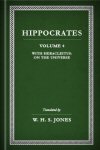
Hippocrates, vol. 4: With Heracleitus: On the Universe
- Authors: Hippocrates and Heracleitus
- Editors: T. E. Page, E. Capps, W. H. D. Rouse, L. A. Post, and E. H. Warmington
- Translator: W. H. S. Jones
- Series: Loeb Classical Library
- Publisher: Harvard University Press
- Publication Date: 1931
- Pages: 262
This volume contains W. H. S. Jones’ English translation of Hippocrates’ writings.
Contents
- The Plane Tree
- Preface
- Introduction
- Nature of Man
- Regimen in Health
- Humours
- Aphorisms
- Regimen I
- Regimen II
- Regimen III
- Dreams
- Heracleitus: On the Universe
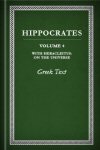
Hippocrates, vol. 4: With Heracleitus: On the Universe: Greek Text
- Authors: Hippocrates and Heracleitus
- Editors: T. E. Page, E. Capps, W. H. D. Rouse, L. A. Post, and E. H. Warmington
- Series: Loeb Classical Library
- Publisher: Harvard University Press
- Publication Date: 1931
- Pages: 261
This volume contains the Greek text of Hippocrates’ writings.
Contents
- The Plane Tree
- Preface
- Introduction
- Nature of Man
- Regimen in Health
- Humours
- Aphorisms
- Regimen I
- Regimen II
- Regimen III
- Dreams
- Heracleitus: On the Universe
Hippocrates of Cos (ca. 460 –370 BC) is regarded as the father of Western medicine. He was the founder of the Hippocratic School of Medicine, and his medical theories and practices influenced centuries of medical developments. He is perhaps best known for the Hippocratic Oath, which, among his other contributions, has been readapted and remains in use today.
Heracleitus of Ephesus, (ca. 535–475 BC) also spelled Heraclitus, was a pre-Socratic Greek philosopher. He was self-taught and reclusive, and his unusual philosophies earned him the names “The Obscure” and “the Weeping Philosopher.”

On the Natural Faculties
- Author: Galen
- Editors: T. E. Page, E. Capps, and W. H. D. Rouse
- Translator: Arthur John Brock
- Series: Loeb Classical Library
- Publisher: Harvard University Press
- Publication Date: 1916
- Pages: 170
This volume contains Arthur John Brock’s English translation of Galen’s writings on the function of the body and its organs. The text addresses the errors and shortcomings of other popular physicians and draws from his extensive experience in both surgery and dissection.

On the Natural Faculties: Greek Text
- Author: Galen
- Editors: T. E. Page, E. Capps, and W. H. D. Rouse
- Series: Loeb Classical Library
- Publisher: Harvard University Press
- Publication Date: 1916
- Pages: 169
This volume contains the Greek text of Galen’s writings on the function of the body and its organs. The text addresses the errors and shortcomings of other popular physicians and draws from his extensive experience both in surgery and dissection.
Aelius Galenus or Claudius Galenus (ca. AD 129–ca. 200), more commonly known as Galen of Pergamon was an influential Roman physician, surgeon, and philosopher. Highly educated, Galen made significant contributions to the fields of anatomy, physiology, pharmacology, neurology, philosophy, and logic. Building on the medical knowledge of prominent physicians such as Hippocrates, Galen was an experienced surgeon and increased his expertise through dissecting animals. After his schooling and some time traveling, Galen settled in Rome as a surgeon for gladiators, and eventually served as several emperors’ personal physician. His writings were highly influential and remained a valuable resource for medical practitioners until the nineteenth century.
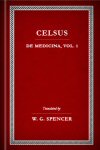
De Medicina, vol. 1
- Author: Celsus
- Editors: T. E. Page, E. Capps, W. H. D. Rouse, L. A. Post, and E. H. Warmington
- Translator: W. G. Spencer
- Series: Loeb Classical Library
- Publisher: Harvard University Press
- Publication Date: 1935
- Pages: 262
This volume contains W. G. Spencer’s English translation of Celsus’ writings on health preservation, prognosis, diagnosis, therapeutics, diseases, and the three major schools of Greek medicine.
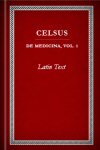
De Medicina, vol. 1: Latin Text
- Author: Celsus
- Editors: T. E. Page, E. Capps, W. H. D. Rouse, L. A. Post, and E. H. Warmington
- Translator: W. G. Spencer
- Series: Loeb Classical Library
- Publisher: Harvard University Press
- Publication Date: 1935
- Pages: 262
This volume contains W. G. Spencer’s English translation of Celsus’ writings on health preservation, prognosis, diagnosis, therapeutics, diseases, and the three major schools of Greek medicine.

De Medicina, vol. 2
- Author: Celsus
- Editors: T. E. Page, E. Capps, W. H. D. Rouse, L. A. Post, and E. H. Warmington
- Translator: W. G. Spencer
- Series: Loeb Classical Library
- Publisher: Harvard University Press
- Publication Date: 1938
- Pages: 146
This volume contains W. G. Spencer’s English translation of Celsus’ writings on drug treatments and local diseases.
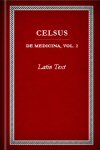
De Medicina, vol. 2
- Author: Celsus
- Editors: T. E. Page, E. Capps, W. H. D. Rouse, L. A. Post, and E. H. Warmington
- Translator: W. G. Spencer
- Series: Loeb Classical Library
- Publisher: Harvard University Press
- Publication Date: 1938
- Pages: 145
This volume contains the Latin text of Celsus’ writings on drug treatments and local diseases.

De Medicina, vol. 3
- Author: Celsus
- Editors: T. E. Page, E. Capps, W. H. D. Rouse, L. A. Post, and E. H. Warmington
- Translator: W. G. Spencer
- Series: Loeb Classical Library
- Publisher: Harvard University Press
- Publication Date: 1938
- Pages: 325
This volume contains W. G. Spencer’s English translation of Celsus’ writings on surgery, with accounts of many operations, including amputation.
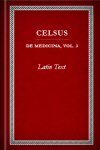
De Medicina, vol. 3: Latin Text
- Author: Celsus
- Editors: T. E. Page, E. Capps, W. H. D. Rouse, L. A. Post, and E. H. Warmington
- Translator: W. G. Spencer
- Series: Loeb Classical Library
- Publisher: Harvard University Press
- Publication Date: 1938
- Pages: 324
This volume contains the Latin text of Celsus’ writings on surgery, with accounts of many operations, including amputation.
Aulus Cornelius Celsus (ca. 25 BC–AD 50) was a Roman encyclopedist. Almost nothing is known about his life. His works makes references that suggest possible places he lived and the period he lived in, but scholars can’t conclusively determine anything about him beyond his authorship of De Medicina. It is not known whether or not he actually practiced medicine, but he makes recommendations of his own that appear to be experience-based, and his works offer one of the best sources of ancient Rome’s medical knowledge.
This title is included in the following collections
You can save when you purchase this product as part of a collection.
Classic Catholic Scholarship C...
$3,413.99$3,413.99Classic Scholarship Collection...
$12,102.39$7,299.99